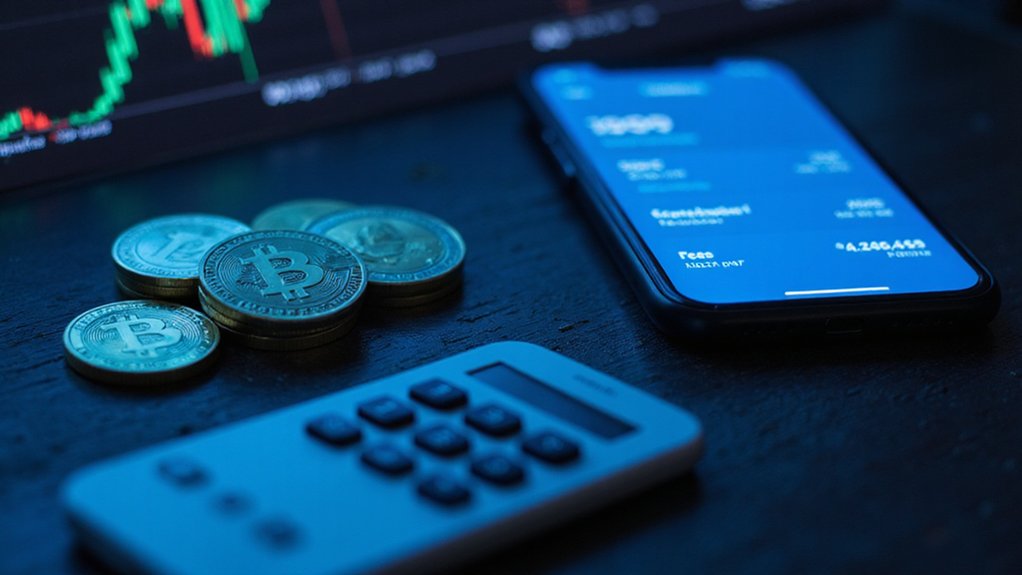Robinhood extends its commission-free ethos to cryptocurrency trading, offering access to over 30 digital assets through its signature streamlined interface. Users can trade major coins like Bitcoin and Ethereum with minimal friction, though a 0.5-1.5% fee applies for debit purchases. The platform lacks crypto-to-crypto trading pairs, requiring fiat funding for transactions. This approach has proven lucrative—crypto operations generated $252 million in Q1 2025, accounting for 43% of Robinhood’s transaction revenue. The pending Bitstamp acquisition suggests further crypto ambitions on the horizon.

How has a stock trading platform managed to capture a significant slice of the cryptocurrency market without the extensive functionality of dedicated exchanges? Robinhood’s strategy—predicated on its now-familiar commission-free trading model—extends seamlessly into its cryptocurrency offerings, where the company has parlayed its user-friendly interface into a formidable crypto presence. With access to over 30 cryptocurrencies (including the usual suspects: Bitcoin, Ether, and Litecoin), Robinhood has transformed itself from a mere stock trading app into a considerable player in the digital asset space.
The platform’s straightforward approach to cryptocurrency belies its growing sophistication. While Robinhood lacks crypto-to-crypto trading pairs (a curious omission in 2025, one might note), it compensates with robust trading tools previously reserved for traditional securities. The Robinhood Legend desktop platform—complete with customizable layouts and technical indicators that would satisfy the most chart-obsessed trader—represents a significant evolution from its early minimalist approach. Mobile users aren’t neglected either, with the app offering expanded features including futures trading capabilities. The U.S. crypto offerings have substantially increased from 21 to 26 coins in Q1 alone. Users appreciate that Robinhood offers no commissions on cryptocurrency trading, though debit card purchases still incur fees.
Financial results validate this approach. Crypto transaction revenues reached an impressive $252 million in Q1 2025—accounting for 43% of Robinhood’s total transaction revenue. Unlike competitors using the traditional maker-taker model for trading fees, Robinhood maintains its simplified fee structure to attract users. This performance occurred despite modest declines in overall crypto trading volumes, suggesting the platform has effectively monetized its user base’s trading activity, even as competitors struggle with similar market conditions.
Robinhood’s crypto strategy pays dividends: $252M in Q1 2025 revenue amid market softness that left competitors floundering.
Robinhood’s pending acquisition of Bitstamp signals an ambitious pivot toward institutional markets. This vertical integration attempt (transitioning from retail-only focus to a more diversified platform) represents a calculated bet on cryptocurrency’s financial future—one that seems increasingly prescient as traditional finance continues its awkward dance with digital assets.
For users, the experience remains characteristically Robinhood: streamlined and accessible, if somewhat constrained. The platform still requires fiat funding and withdrawals, and charges debit card purchase fees ranging from 0.5% to 1.5%—a reminder that “commission-free” rarely means “cost-free” in the financial world.
Frequently Asked Questions
What Are the Tax Implications of Crypto Trading on Robinhood?
Crypto trading on Robinhood generates tax implications that few traders adequately anticipate.
The IRS classifies cryptocurrency as property, triggering capital gains reporting requirements on Schedule D and Form 8949.
Robinhood reports gross proceeds via Form 1099-B and rewards exceeding $600 on Form 1099-MISC, while employing FIFO accounting.
Traders must meticulously track their cost basis—particularly challenging with transfers—as Robinhood’s documentation may prove insufficient for thorough tax compliance.
The responsibility for accurate reporting ultimately rests with the taxpayer, not the platform.
Can I Transfer My Crypto to External Wallets?
Robinhood indeed permits crypto transfers to external self-custody wallets—though unsurprisingly, not without procedural hoops.
Users must complete identity verification and implement two-factor authentication (a process potentially spanning five business days), and transfers must occur between compatible networks.
The platform supports numerous currencies including Bitcoin, Ethereum, and Solana, which can be sent to compatible wallets like Ledger Nano.
Address verification may be required—a prudent if somewhat tedious security measure.
How Does Robinhood’s Crypto Pricing Compare to Other Exchanges?
Robinhood’s crypto pricing structure stands out with its 0.55% trading fee—competitive when juxtaposed with Coinbase’s variable 0-0.60% rate.
The platform’s free debit card deposits (a rarity in the space) create one of the most cost-efficient combined fee structures available.
While built-in spreads exist (as they do everywhere), Robinhood’s $1 minimum deposit threshold and straightforward pricing model make it particularly appealing for the cost-conscious trader maneuvering the often byzantine fee structures of cryptocurrency exchanges.
What Security Measures Protect My Cryptocurrency Investments?
Robinhood employs multiple security layers to safeguard crypto investments: two-factor authentication, device verification, and hashed passwords form the frontline defenses.
The platform stores most assets in cold storage—offline systems inaccessible to hackers—while maintaining real-time activity monitoring.
Transaction safeguards include manual withdrawal enablement (disabled by default) and explicit confirmation requirements.
Importantly, while crime insurance offers some protection, it excludes user negligence—a vital distinction in an ecosystem where transfers remain irreversible once executed.
Does Robinhood Offer Staking Rewards for Held Cryptocurrencies?
Yes, Robinhood offers staking rewards for select cryptocurrencies—currently Ethereum and Solana.
Users receive between 50-100% of ETH protocol rates, with rewards automatically credited to their accounts.
The dynamic reward rates fluctuate with market conditions and are reduced by both partner and Robinhood fees.
Curiously, while the platform requires 32 ETH to activate validators, it distributes rewards proportionally among all staked ETH—a rather democratized approach in the otherwise stratified crypto landscape.









